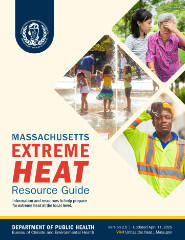Explore a curated collection of guides, data tools, safety tips, and planning resources to help communities, agencies, and individuals across Massachusetts understand, prepare for, and respond to periods of extreme heat.
Featured extreme heat resources
Extreme Heat Resource Guide
Extreme heat best practices for public and semi-public pool operators
Housing–extreme heat best practices for multi-unit residential rental properties with limited cooling options
Extreme heat best practices for farm labor camp operators
Extreme heat best practices for operators of recreational camps for children
Extreme heat best practices for correctional facilities
General Heat and Climate Resources
- Unhealthy Heat Forecast
Stay ahead of rising temperatures with a 7-day forecast and tracks daily and weekly levels of heat in the state and alerts you when an Unhealthy Heat Alert is active. Use this tool to plan, take protective action, and share timely information with your community. - Extreme Heat
Visit our Extreme Heat page for essential information, guidance, and tools to stay safe in hot weather. - Extreme Heat Resource Guide (PDF) | (DOCX)
Comprehensive guidance on responding to extreme heat for local health departments and communities. - Climate Hazard Adaptation Profiles (CHAPs)
Explore heat-related risks, vulnerable populations, and public health actions to reduce harm. - Climate fact sheet: extreme heat events (available in 16 languages)
Summarizes health impacts of heat and what individuals can do to stay safe. - Extreme Heat Safety Tips
Stay cool, safe, and prepared with practical guidance for before and during extreme heat events.
Personal Safety and Health Actions
- Prevent and treat heat-related illness (DPH)
Signs, symptoms, and steps for managing heat cramps, exhaustion, and heat stroke. - What to Do During an Extreme Heat Event (EPA/CDC) (PDF) | (DOCX)
Practical safety steps to take before and during extreme heat events. - Heat Exhaustion vs. Heat Stroke (DPH)
Know the difference between heat exhaustion and stroke and how to respond to both.
Vulnerable Populations and Health
- Heat and Medications – Guidance for Clinicians (CDC)
Explains how medications may increase sensitivity to heat and what clinicians should know. - Heat and Older Adults (Aged 65+) (CDC)
Simple actions to protect older adults from heat-related illness and death.
Outdoor Air and Environmental Quality
- MassDEP MassAir Online
Daily air quality updates for Massachusetts from over 20 monitoring stations statewide. - AirNow.gov (EPA)
Track your area’s real-time air quality and health risk levels from heat-related pollution. - Poor Outdoor Air Quality – Fact Sheet (available in 16 languages)
Details how air quality impacts health, especially during extreme heat events. - Extreme Heat and Poor Air Quality
Overview of how heat worsens air quality and affects respiratory and cardiovascular health.
Recreation and swimming safety during hot and humid weather
- Interactive Beach Water Quality Dashboard
Check water quality testing results to know if it's safe to swim. - Climate fact sheet: contact with cyanobacteria (available in 16 languages)
Warmer weather may increase algae blooms—avoid swimming in discolored or scummy water. - Extreme heat best practices for public and semi-public pools (PDF) | (DOCX)
Stay safe while swimming—monitor heat risks, provide shade, and maintain water quality during heat waves. - Recreational water safety for everyone
Multilingual safety tips for swimming, pool operation, and summer recreation. - Extreme heat best practices for recreational camps (PDF) | (DOCX)
Protect campers and staff through hydration, scheduling, shaded areas, and safe swimming guidance.
Indoor safety during hot and humid weather
- Housing - extreme heat best practices for multi-unit residential properties (PDF) | (DOCX)
Support tenant and staff safety by improving cooling, communication, and property maintenance during heat waves. - Climate fact sheet: mold growth (available in 16 languages)
Hot, humid weather and flooding can increase mold risks in homes and buildings. - Mold Cleanup, Repairs, and Excess Moisture Control (PDF) | (DOCX)
Tips for identifying, cleaning, and preventing mold caused by heat, humidity, or water damage.
Workplace safety during hot and humid weather
- Heat Prevention – Tips for Outdoor Workers (PDF)
Protect outdoor workers from heat illness with hydration, rest, and shade. - Heat Illness Prevention for Employers (PDF)
Tips for employers to keep workers safe during hot weather. - Extreme heat best practices for farm labor camp operators (PDF) | (DOCX)
Practical steps to protect farm workers from heat stress and ensure safe living and working conditions. - Extreme heat best practices for correctional facilities (PDF) | (DOCX)
Guidance for protecting staff and incarcerated individuals from heat-related illness in correctional settings. - Heat Stress and Hydration (CDC) (PDF)
Stay safe and hydrated to avoid heat stress on the job.
Water, Flooding, and Environmental Hazards
- Climate fact sheet: contaminated water and related hazards (available in 16 languages)
Floodwaters may carry pollutants and bacteria harmful to health—learn prevention tips. - Climate Fact Sheet: water contaminated with Fecal Bacteria (available in 16 languages)
Heavy rains can affect water quality—learn how to protect your drinking water. - Climate fact sheet: water and shellfish contaminated with Vibrio bacteria (available in 16 languages)
Warming oceans increase the risk of vibrio bacteria in coastal water and seafood. - Climate fact sheet: inland and tidal flooding (available in 16 languages)
Flood risks are increasing due to climate change—know how to protect health.
Ticks, Mosquitoes, and Vector-Borne Diseases
- Climate fact sheet: ticks and mosquitoes (available in 16 languages)
Rising heat and rain increase the risk of tick- and mosquito-borne illnesses. - Massachusetts Arbovirus Update
Monitor risk levels for West Nile Virus and EEE in your area. - Mosquitoes and Ticks
Learn what Massachusetts is doing to keep you safe – and ways you can protect yourself and your family – from mosquito and tick bites and the illnesses they can cause.
Community Data and Monitoring Tools
- Massachusetts Environmental Public Health Tracking (EPHT)
Interactive maps and data on heat, climate risk, and health in your community. - Climate Enhanced Community Profiles
Access climate projections and public health data for planning and risk reduction. - Community Heat Risk Map – HeatRisk Tool (NOAA/CDC)
Forecasts the heat-related risk level for your area over the next 7 days.
Additional resources
-
Open PDF file, 4.61 MB, Extreme Heat Resource Guide (PDF) (English, PDF 4.61 MB)
-
Open DOCX file, 40.14 KB, Extreme Heat Resource Guide (DOCX) (English, DOCX 40.14 KB)





